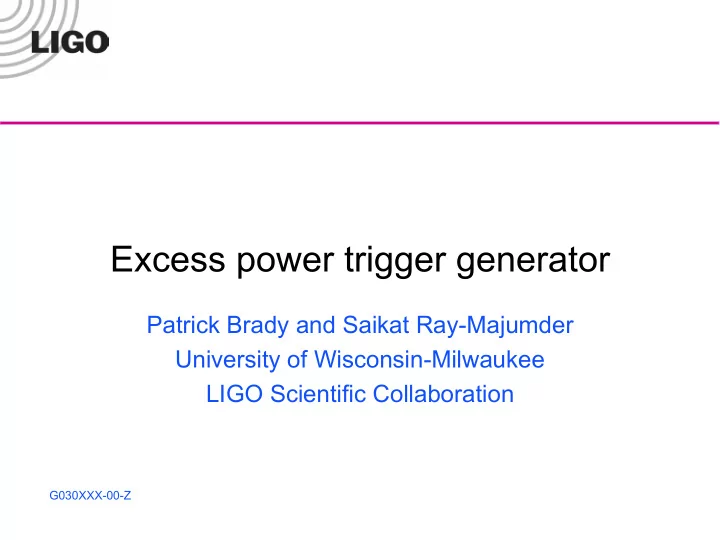

Excess power trigger generator Patrick Brady and Saikat Ray-Majumder University of Wisconsin-Milwaukee LIGO Scientific Collaboration G030XXX-00-Z
Excess power method: the basic idea • The basic idea: » Pick a start time, a duration (dt), and a frequency band (df) » Fourier transform detector data with specified start time and duration » Sum the power in the frequency band » Calculate probability of obtaining the summed power from Gaussian noise using a χ 2 distribution with (2 x dt x df) degrees of freedom » If the probability is small, record a trigger » Repeat procedure for all start times, frequency bands and durations • For Gaussian noise, the method is optimal to detect bursts of specified duration and frequency bandwidh » Details are in Anderson, Brady, Creighton and Flanagan [PRD 63, 042003. (2001)] G030XXX-00-Z 18/12/2003 GWDAW - Dec 2003 2
Excess-power method: time-frequency decomposition Using N data points • corresponding to maximum duration of signal to be detected Construct time-frequency • planes at multiple resolutions Each plane is constructed to • have pixels of unit time- frequency volume • Time resolution improves by factor of 2 from plane to plane G030XXX-00-Z 18/12/2003 GWDAW - Dec 2003 3
Excess-power method: Implementation Calculate time-frequency • planes as described above’ Compute power in tiles • defined by a start-time, duration, low-frequency, frequency band Output is sngl_burst trigger if • probability of obtaining power from Gaussian noise is less than user supplied threshold G030XXX-00-Z 18/12/2003 GWDAW - Dec 2003 4
Tuning the search code • Parameters available for tuning » Lowest frequency to search » Maximum and minimum time duration of signals » Maximum bandwidth » Confidence threshold » Number of events recorded for each 1 second of data • Tuning procedure » Lowest frequency decided based on high glitch rate below 130 Hz » Max duration is 1 second; Min duration is 1/64 seconds » Max bandwidth of a tile 64Hz, but allows for broader band signals by clustering » Tuned confidence threshold and number of events recorded to allow trigger rate ~ 1 Hz G030XXX-00-Z 18/12/2003 GWDAW - Dec 2003 5
Running the search on large data sets • Excess power runs standalone using Condor batch scheduler » Directed Acyclic Graph describes workflow • Use LALdataFind to locate data » Interrogation of replica catalog maintained by LDR (S. Koranda) • All search code in » LAL and LALApps (many contributors) • Power code » Generates triggers from each interferometer • Coincidence stage of the search is part of the jobs we run » Coincidence needs to be tuned within burst group (See talk by Cadonati) G030XXX-00-Z 18/12/2003 GWDAW - Dec 2003 6
Performance on interferometer data 600s: uncalibrated data Same data with G030XXX-00-Z Sine-Gaussians at 18/12/2003 GWDAW - Dec 2003 7 250Hz, h0 = 6e-20
Frequency Dependence of Triggers Hanford 4km: # of triggers Livingston 4km: # of triggers in various freq. bands in various freq. bands 800 Triggers 800 Triggers Frequency Frequency G030XXX-00-Z 18/12/2003 GWDAW - Dec 2003 8
Measuring the efficiency of algorithm • Sine Gaussian waveform » h + (t) = h 0 Sin[ 2 π f 0 (t-t 0 ) ] exp[ - (t – t 0 ) 2 / τ 2 ] » h x (t) = 0 • Signal parameters used: » Frequencies: 235, 319, 434, 590, 801 » Q = sqrt(2) π f 0 τ = 8.89 » h 0 = [10 -21 ,10 -17 ] uniform on log scale • Location on sky for single detector tests: » Zenith of each detector » Linearly polarized w.r.t. that detector » That is F + =1, F x =0 G030XXX-00-Z 18/12/2003 GWDAW - Dec 2003 9
Efficiencies to Q=9 Sine-Gaussians 4km Interferometers G030XXX-00-Z 18/12/2003 GWDAW - Dec 2003 10
Parameter accuracy: peak time and central frequency Q=9 Sine-Gaussian at 235Hz Peak time Central frequency G030XXX-00-Z 18/12/2003 GWDAW - Dec 2003 11
Continuing work as part of LSC burst analysis group • Tune the coincidence step to best utilize triggers from excess power • Extend efficiency measurements to all sky for sine- Gaussians • Extend efficiency measurements to include supernova waveforms • Implement multi-detector extension of excess power discussed in Anderson, Brady, Creighton and Flanagan [PRD 63, 042003. (2001)] • Test alternative statistic involving over-whitened data [See ABCF and/or Vicere PRD 66, 062002. (2002)] G030XXX-00-Z 18/12/2003 GWDAW - Dec 2003 12
Recommend
More recommend